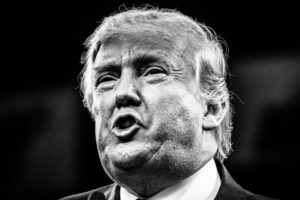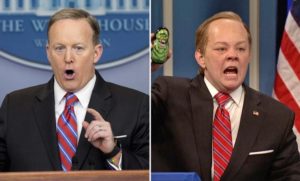
The big “get” of President Trump’s interview with the New York Times was confirmation of a story that’s been going around Washington for months. Photograph by Mark Peterson / Redux
It is often said, and with ample reason, that much of what Donald Trump says isn’t worth a jot. As Tony Schwartz, Trump’s ghostwriter, noted last year, “lying is second nature to him.” When he isn’t telling outright whoppers, he exaggerates things outrageously, and his utterances often bear little resemblance from one day to the next. On Tuesday, he said that Republicans should let Obamacare crash and burn. On Wednesday, he said that he wanted to see it replaced.
But, whereas Trump’s statements often fail to withstand inspection when examined individually, analyzing a group of them together can sometimes provide valuable insights into his mind-set, which, at this time, appears to be even more addled than usual. The interview that Trump gave on Wednesday to three reporters from the Times offers us that opportunity.
A partial transcript of the interview, which the Times posted online, shows him eager to impress his interlocutors despite the fact that they work for a publication he has many times described as “failing” and “fake news.” He boasted about the response he received to the speech he recently gave in Poland, and how much the French President, Emmanuel Macron, likes him. (“He’s a great guy. Smart. Strong. Loves holding my hand.”)
At one point, Trump even played the role of amateur historian, pointing out how the armies of Napoleon and Hitler came to grief in the Russian winter, and adding that Napoleon “didn’t go to Russia that night because he had extracurricular activities, and they froze to death.”
That claim might be dubbed “fake history,” but it wouldn’t do to dwell on it because the interview also covered many more consequential subjects, including the Russia investigation and the now infamous meeting that his son, Donald Trump, Jr., arranged at Trump Tower last June. The overwhelming impression from the transcript is of a President who considers himself above the law, and who believes himself to be, through no fault of his own, besieged by internal and external enemies, particularly in the Justice Department and the F.B.I. As he put it at one point, “I have headaches, that’s what I have, I have headaches.”
As usual, Trump reserved some of his vitriol for James Comey, the man he fired as F.B.I. director. He repeated his unfounded claim that Comey leaked classified information, and accused him of lying to Congress. He also claimed that Comey had been looking for “leverage” when he warned Trump in January about an opposition-research dossier that contained salacious allegations about the President. (How would this be leverage? It is unwise to follow Trump’s logic too closely.)
The big news “get” in the interview was confirmation of a story that’s been going around Washington for months: Trump blames many of his woes on one of his own key lieutenants, Jeff Sessions, the Attorney General, who recused himself from overseeing the Russia investigation.
TRUMP: So Jeff Sessions takes the job, gets into the job, recuses himself. I then have—which, frankly, I think is very unfair to the president. How do you take a job and then recuse yourself? If he would have recused himself before the job, I would have said, “Thanks, Jeff, but I can’t, you know, I’m not going to take you.”
Although Trump doesn’t say it straight out, this transcript makes it clear that he thinks that Sessions, despite all the questions he was facing about his own contacts with the Russian Ambassador, should have refused to recuse himself from the investigation and protected the White House as the Russia investigation proceeded. Instead, Sessions failed him, with consequences that Trump immediately went on to detail.
TRUMP: It’s extremely unfair, and that’s a mild word, to the president. So he recuses himself. I then end up with a second man, who’s a deputy.
HABERMAN: Rosenstein.
TRUMP: Who is he? And Jeff hardly knew. He’s from Baltimore.
Actually, Rod Rosenstein, the deputy Attorney General, grew up in Pennsylvania. He did serve for twelve years as the U.S. Attorney for a district encompassing Baltimore, a city that Trump views as a Democratic swamp. And it was Rosenstein, with Sessions recused, who appointed Robert Mueller as a special counsel to investigate the alleged ties between Trump’s campaign and Russia. Trump also considers this appointment to have been unnecessary. “I have done nothing wrong,” he said. “A special counsel should never have been appointed in this case.”
Of course, Rosenstein also did Trump a favor earlier on in his Administration: he submitted a letter to Sessions saying that James Comey should be replaced as F.B.I. director because of his mishandling of the agency’s investigation into Hillary Clinton’s e-mails. In the interview, Trump concedes as much, saying, “O.K., he gives me a letter about Comey . . . and it certainly didn’t hurt to have the letter.”
But in Trump’s mind it is clear that that incident was ancient history, and Rosenstein is now part of a cabal of Washington insiders—officials, prosecutors, and investigators—who are out to get him, regardless of his innocence. In addition to Rosenstein, these insiders include Mueller, whom he accused of having undisclosed conflicts of interest, and Andrew McCabe, the deputy director of the F.B.I., whose wife, Jill, ran as a Democrat for a seat in the Virginia state Senate in 2015.
To Trump, who views everything through a lens of self-interest, there are no matters of legitimate public interest at stake in the Russia story; no public-spirited officials trying to fulfill their duty to the public; no duty on his part to respect the need for distance between the White House and the Justice Department when it comes to matters having to do with the President. It is all just a political racket, and he is the one getting screwed.
In truth, of course, Trump has himself to blame for Mueller’s appointment. By going ahead and firing Comey, Trump prompted Comey to leak incriminating details about their meetings. And that left Rosenstein little choice but to set up an investigation that was independent of the Justice Department.
Practically everybody in Washington agrees that Trump made a monumental error in firing Comey. But when one of the Timesreporters raised this possibility, Trump, characteristically, refused to admit it, saying, merely, “I think I did a great thing for the American people.”
Another problem with Trump’s narrative is that significant new information keeps emerging about links between Russia and his campaign, including the now infamous sitdown that Trump, Jr., had with a Russian lawyer. When the Times reporters pressed him on this, Trump restated his position: it was a routine meeting, and he wasn’t told about it at the time. But he also made a new point—new to me, anyway—arguing that, by last June, when the meeting took place, he didn’t even need any more dirt to hurl at Clinton: he already had plenty.
“There wasn’t much I could say about Hillary Clinton that was worse than what I was already saying,” he said. “I was talking about, she deleted and bleached, which nobody does because of the cost . . . 33,000 emails. I talked about the back of the plane, I talked about the uranium deal, I talked about the speech that Russia gave Clinton — $500,000 while she was secretary of state . . . honestly, Peter, I mean, unless somebody said that she shot somebody in the back, there wasn’t much I could add to my repertoire.”
You have to give points for creativity, I suppose. Like many con men, Trump never lacks a defense. But what he said in the interview was directly contradicted by his own words on July 27, 2016, just weeks after the Trump Tower meeting, when he publicly urged the Kremlin to hack Clinton’s e-mail, saying, “Russia, if you’re listening, I hope you’re able to find the thirty thousand e-mails that are missing.”
It is a pity the Times reporters didn’t present this quote to Trump. No doubt, he would have come up with another bogus explanation. He always does. At some point, though, as the Russia investigation gets ever closer to him, he will almost certainly have to answer questions under oath, and there is no knowing how he might react. At the end of the interview, one of the reporters asked Trump if he would fire Mueller if his investigation “went outside of certain parameters.” Trump’s answer was instructive: “ I can’t answer that question because I don’t think it’s going to happen.”


